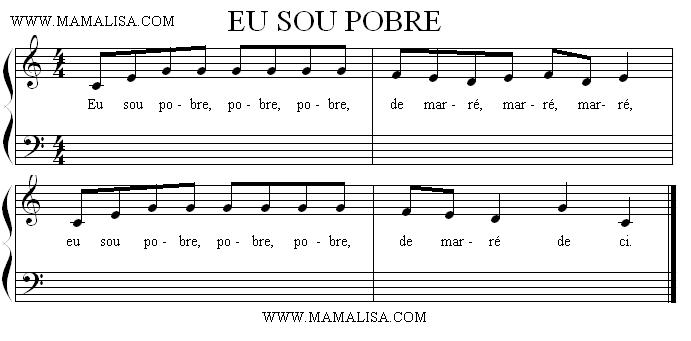Eu sou pobre
About Eu sou pobre: "It is to be sung by two groups of girls, the 'rich' and the 'poor'. They form a row in front of each other, and they sway back and forth as they sing. It goes like this..." -João Carlos
Eu sou pobre
I Am Poor
Singing Game
Singing Game
(Portuguese)
(English)
Pobres:
Eu sou pobre, pobre, pobre, de marré, marré marré
Eu sou pobre, pobre, pobre, de marré de ci.
Ricas:
Eu sou rica, rica, rica, de marré, marré, marré
Eu sou rica, rica, rica, de marré de ci.
Ricas:
Quero uma de vossas filhas, de marré, marré marré,
Quero uma de vossas filhas, de marré de ci.
Pobres:
Escolhei a qual quiser, de marré, marré, marre,
Escolhei a qual quiser, de marré de ci.
Ricas (escolhendo uma menina "pobre"):
Eu quero a Maria Alice*, de marré, marré, marré,
Eu quero a Maria Alice, de marré de ci
Pobres:
Que ofício dar a ela, de marré, marré, marré,
Que ofício dar a ela, de marré de ci
Ricas (escolhendo um ofício):
Ofício de costureira (cozinheira, lavadeira etc) de marré, marré, marré
Ofício de costureira (cozinheira, lavadeira etc) de marré de ci.
A menina escolhida:
Esse ofício não me agrada, de marré, marré, marré
Esse ofício não me agrada de marré de ci.
Ricas (escolhendo um outro ofício):
Ofício de cozinheira (lavadeira etc) de marré, marré, marré
Ofício de cozinheira (lavadeira etc) de marré de ci.
A menina escolhida:
Esse ofício me agrada, de marré, marré, marré
Esse ofício me agrada de marré de ci.
Então todas se dão as mãos fazendo um círculo e cantam:
Nós faremos a festa juntas. de marré, marré...
Nós faremos a festa juntas, de marré, de ci.
The "Poor" Ones Sing:
I am poor, poor, poor, here I stop, I stop, I stop
I am poor, poor, poor, here I stop and stay.
The "Rich" Ones Sing:
I am rich, rich, rich, here I stop, I stop, I stop
I am rich, rich, rich, here I stop and stay.
The Rich:
I would like one of your daughters, here I stop, I stop, I stop
I would like one of your daughters, here I stop and stay.
The Poor:
Choose whichever one you want, here I stop, I stop, I stop
Choose whichever one you want, here I stop and stay.
The Rich (choosing one of the "poor" girls):
Then I would like Mary Alice*, here I stop, I stop, I stop
Then I would like Mary Alice, here I stop and stay.
The Poor:
What's the career that you'll give her, here I stop, I stop, I stop
What's the career that you'll give her, here I stop and stay.
The Rich (choosing a trade):
I'll give her a job as a seamstress (cook, washerwoman, etc.), here I stop, I stop, I stop
I'll give her a job as a seamstress (cook, washerwoman, etc.), here I stop and stay.
The chosen kid sings:
This career does not please me, here I stop, I stop, I stop
This career does not please me, here I stop and stay.
The Rich (choosing another trade):
I'll give you the job of a cook ( washerwoman, etc.), here I stop, I stop, I stop
I'll give you the job of a cook (washerwoman, etc.), here I stop and stay.
The chosen kid sings:
This career it does please me, here I stop, I stop, I stop
This career it does please me, here I stop and stay.
Then they all clasp hands, making a circle, and sing:
We'll have a party together, here I stop, I stop, I stop
We'll have a party together, here I stop and stay.
Notes
*Or choose one of the "poor" girls in the game and sing her name here instead.
If the girl does not like the career first offered, she says "Este ofício não me agrada, de marré, marré, marré" (This trade does not please me etc) and then she is given another career until she likes the one given.
The translation is singable.
João Carlos sent us this song with the note: "This is a traditional Brazilian nursery rhyme, which is from French origin. The words are in Portuguese and, sometimes, in invented words to imitate the French sound..."
1 Je suis pauvre, pauvre, pauvre, je m'arrê-, m'arrê-, m'arrê-
Je suis pauvre, pauvre, pauvre, je m'arrête ici.
2 Je suis riche, riche, riche.... etc
3 Je veux une de vos filles…
4 Choisissez celle que vous plaît…
5 Quel métier vous lui donnerez
6 Le métier de couturière (cuisinière, lavandière etc)
7 Ce métier me plaît
8 Nous ferons la fête toutes ensemble
Monique in France searched around for this song and wrote, "...I haven't heard about it or come across it anywhere, not in songbooks, books about traditional children's songs, it can't be found on the internet, so if someone ever heard of this in French, please have them let us know."
João Carlos wrote: "It is possible that the song originated in France but did not survive there."
Later Monique wrote: "It's possible that this song first started as "Ah mon beau château" then the process could have been:
1. The song went to Spain and became "Ambó ató" in which the line, Ah mon beau château ma tant' tire lire lire became Ambó ató matarile rile rile. Then instead of being offered some jewelry and other valuable goods, the girl is offered a trade. The tune is slightly different.
And/or 2. The song may have been merged with some other song previously existing in Spain. From this pattern we can take another step and find "¿Dónde están las llaves?" with the tune straying further away from the previous one and "Buenos días su señoría" with a different tune though the beat and tempo are the same. All these versions of the tune are spread all over the Spanish speaking world.
Now last but not least we get the Brazilian "Eu sou pobre, pobre, pobre" with the same tune as ""Buenos días su señoría"" though the tempo is much slower, but it has more or less the same lyrics, only the beginning is really different. Go figure!"
João Carlos wrote later, "The song came out nicely, although (the video is) not as I used to sing it when I was a child (I am 79 now...). There was no repetition first by a single voice, then by the choir. The grammatical person used was 'vós' (second person plural) in this rendering they use the more modern 'você'."
*****
If anyone knows more about the origin of this song, please email me. thanks! -Mama Lisa


Thanks!
Thanks and Acknowledgements
Many thanks to João Carlos for contributing this nursery rhyme game.
Translated into English by Monique Palomares and Lisa Yannucci.
Obrigada!

























